From A History of the Amistad Captives by John W. Barber (1840)
Click on a name.
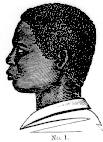 |
1. Cin-gue |
 |
2. Grab-eau |
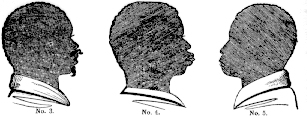 |
3. Kimbo 4. Kon-no-ma 5. Bur-na |
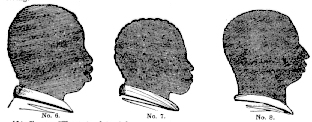 |
6. Bar-tu 7. Gna-kwoi 8. Kwong |
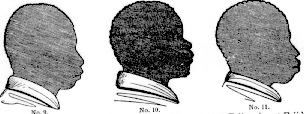 |
9. Fu-li-wa
10. P-ie 11. Pung-wu-ni |
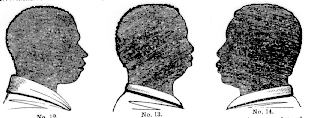 |
12. Ses-si 13. Mo-ru 14. Ndam-ma |
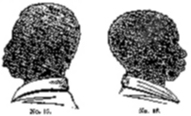 |
15. Fu-li-wu-lu 16. Ba-u |
 |
17. Ba |
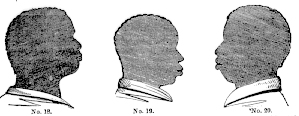 |
18.Shu-le 19. Ka-le 20. Ba-gua |
 |
21. Sa |
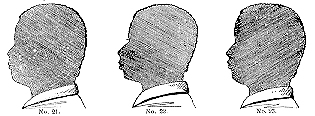 |
22. Kin-na 23. Nga-ho-ni 24. Fa-kin-na |
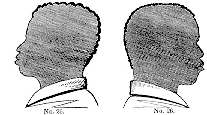 |
25. Fa-gin-na 26. Ya-boi |
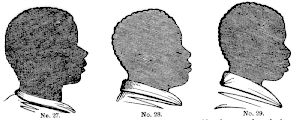 |
27. Fa-ban-na 28. Tsu-ka-ma 29. Ber-ri |
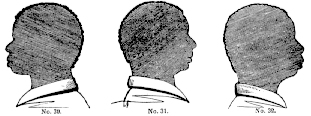 |
30. Fo-ni 31. Bur-na 32. Shuma |
 |
33. Ka-li 34. Te-me 35. Ka-gne |
 |
36. Mar-gru |
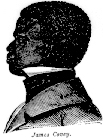 |
37. James Covey |
The descriptions that follow are from A History of the Amistad Captives by John W. Barber (1840).
(1.) Sing-gbe, [Cin-gue,] (generally spelt Cinque~) was born in Ma-ni, in Dzho-poa, i.e. in the open land, in the Mendi country. The distance from Mani to Lomboko, he says, is ten suns, or days. His mother is dead, and he lived with his father. He has a wife and three children, one son and two daughters. His son's name is Ge-waw, (God.) His king, Ka-lum-bo, lived at Kaw-men-di, a large town in the Mendi country. He is a planter of rice, and never owned or sold slaves. He was seized by four men, when traveling in the road, and his right hand tied to his neck. Ma-ya-gi-la-lo sold him to Ba-ma-dzha, son of Shaka, king of Gen-du-ma, in the Vai country. Bamadzha carried him to Lomboko and sold him to a Spaniard. He was with Mayagilalo three nights; with Bamadzha one month, and at Lomboko two months. He had heard of Pedro Blanco, who lived at Te-i-lu, near Lomboko. BACK
(2.) Gi-la-ba-ru, [Grab-eau,] (have mercy on me)was born at Fu-lu, in the Mendi country, two moons' journey into the interior. His name in the public prints is generally spelt Grabeau. He was the next after Cingue in command of the Amistad. His parents are dead, one brother and one sister living. He is married, but no children; he is a planter of rice. His king Baw-baw, lived in Fu-lu. He saw Cingue at Fulu and Fadzhinna, in Bombali. He was caught on the road when going to Taurang, in the Bandi country. to buy clothes. His uncle had bought two slaves in Bandi, and gave them in payment for a debt; one of them ran away and he (Grabeau) was taken for him. He was sold to a Vai-man, who sold him to Laigo, a Spaniard, at Lomboko. Slaves in this place are put into a prison, two are chained together by the legs, and the Spaniards give them rice and fish to eat. In his country has seen people write--they wrote from right to left. They have cows, sheep, and goats, and wear cotton cloth. Smoking tobacco is a common practice. None but the rich eat salt, it costs so much. Has seen leopards and elephants, the latter of which, are hunted for ivory. Grabeau is four feet eleven inches in height; very active, especially in turning somersets. Besides Mendi, he speaks Vai, Kon-no and Gissi. He aided John Ferry by his knowledge of Gissi, in the examination at Hartford. BACK
(3.)Kimbo (cricket) is 5 ft. 6 in. in height, with mustaches and long beard; in middle life, and is intelligent. He was born at Maw-ko-ba, a town in the Mendi country; his father was a gentleman, and after his death, his king took him for his slave, and gave him to his son Ban-ga, residing in the Bullom country. He was sold to a Bullom man, who sold him to a Spaniard at Lomboko. He counts thus: 1, eta; 2 fili; 3, kiau-wa; 4, naeni; 5, loelu; 6, weta; 7, wafura; 8, wayapa; 9, ta-u; 10, pu.--Never saw any books in his country. When people die in his country, they suppose the spirit lives but where, they cannot tell. BACK
(4.)Nazha-u-lu (a water stick,) also called from his country, Kon-no-ma, is 5 ft. 4 in. in height, has large lips, and projecting mouth, his incisor teeth pressed outward and filed, giving him rather a savage appearance; he is the one who was supposed to be of cannibal, tattooed in the forehead with a diamond shaped figure. He was born in the Konno country: his language is not readily understood by Covey, the interpreter. Kon-no-ma recognizes many words in Mungo Park's Mandingo vocabulary. BACK
(5.)Bur-na, the younger, height 5 ft. 2 in. lived in a small town in the Mendi country. He counts in Tim-ma-ni and Bullom. He was a blacksmith in his native village, and made hoes, axes, and knives; he also planted rice. He was sold for crim. con. to a Spaniard at Lomboko. He was taken in the road, and was four days in traveling to Lomboko. Has a wife and one child, a father, three sisters and brother living. BACK
(6.) Gba-tu, (Bar-tu,) (a club or sword,) height 5 ft. 6 in. with a tattooed breast was born in the country of Tu-ma, near a large body of fresh water, called Ma-wu-a. His father is a gentleman and does no work. His king, named Da-be, resided in the town of Tu-ma. He was sent by his father to a village to buy clothes; on his return, he was seized by six men, and his hands tied behind; was ten days in going to Lomboko. There are high mountains in his country, rice is cultivated, people have guns; has seen elephants. Remark.--There is a village called Tu-ma, in the Timmani country, 60 miles from Sierra Leone, visited by Major Laing. BACK
(7.)Gna-kwoi (in Ba-lu dialect, second born) was born at Kong-go-la-hung, the largest town in the Balu country. This town is situated on a large river called in Balu, Za-li-bu; and in Mendi, Kal-wa-ra: fish are caught in this river as large a man's body--they are caught in nets and sometimes shot with guns. When going to the gold country to buy clothes, he was taken and sold to a Vai-man, who sold him to a Spaniard named Peli. Gna-kwoi has a wife and one child; he calls himself a Balu-man; has learned the Mendi language since he was a slave; 5 ft. 6 in. in height. BACK
(8.)Kwong was born at Man-bui, a town in the Mendi country. When a boy he was called Ka-gnwa-ni. Kwong is a Bullom name. He was sold by a Tim-nani gentleman in the Du-bu country, for crim. con. with his wife, to Luisi, a Spaniard, at Lomboko. He is in middle life, 5 ft. 6 in. high. BACK
(9.) Fu-li-wa, Fu-li, (sun,) called by his fellow prisoners Fuliwa, (great Fuli,) to distinguish him from Fu-li-wu-lu, (little Fuli,) was born at Ma-no, a town in the Mendi country, where his king, Ti-kba, resided. He lived with his parents, and has five brothers. His town was surrounded by soldiers, some were killed, and he with the rest were taken prisoners. He passed through the Vai country, when taken to Lomboko, and was one month on the journey. He is in middle life, 5 ft. 3 in. high, face broad in the middle, with a slight beard. It was this Fuli who instituted the suit against Ruiz and Montez. BACK
(10.) P-ie, Pi-e, or Bi-a, (5 ft. 4 1-2 in. high,) calls himself a Timmani, and the father of Fu-li-wu-lu. He appears to have been distinguished for hunting in his country: says he has killed 5 leopards, 3 on the land, and 2 in the water; has killed three elephants. He has a very pleasant countenance; his hands are whitened by wounds received from the bursting of a gun barrel, which he had overloaded when showing his dexterity. He had a leopard's skin hung up on his hut, to show that he was a hunter. He has a wife and four children. He recognizes with great readiness the Timmani words and phrases contained in Winterbottom's account of Sierra Leone. He and his son seemed overjoyed to find an American who could articulate the sound of their native tongue. BACK
(11.) Pu-gnwaw-ni, [Pung-wu-ni,] (a duck,) 5 ft. 1 in. high, body tattooed, teeth filed, was born at Fe-baw, in Sando, between Mendi and Konno. His mother's brother sold him for a coat. He was taken in the night, and was taken a six days' journey and sold to Garloba, who had four wives. He stayed with this man two years, and was employed in cultivating rice. His master's wives and children were employed in the same manner, and no distinction made in regard to labor. BACK
(12.) Ses-si, 5 ft. 7 1-2 in. with a sly and mirthful countenance, was born in Mas-sa-kum, in the Bandi country, where his king, Pa-ma-sa, resided. He has three brothers, two sisters, a wife, and three children. He is a blacksmith, having learned that trade of his brother; he made axes, hoes, and knives from iron obtained in the Mendi country. He was taken captive by soldiers and wounded in the leg. He was sold twice before he arrived at Lomboko, where he was kept about a month. Although a Bandi, he appears to have been able to talk in Mendi. BACK
(13.)Mo-ru, middle age, 5 ft. 8 1-2 in. with full negro features, was born at Sanka, in the Bandi country. His parents died when he was a child. His master, Margona, who sold him, had ten wives and many houses; he was twenty days on his journey to Lomboko. He was sold to Be-le-wa, (great whiskers,) i.e. to a Spaniard. BACK
(14.) Ndam-ma, (put on or up,) 5 ft. 3 in. a stout built youth, born in the Mendi country, on the river Ma-le. His father is dead, and he lived with his mother; has a brother and sister. He was taken in the road by twenty men, and was many days in traveling to Lomboko. BACK
(15.) Fu-li-wu-lu, (Fuli,) or, as the name has been written, Furie, (sun,), called Fuliwulu, to distinguish him from Fuliwa, (great Fuli,) lived with his parents in the Timmani, near the Mendi country. He is the son of Pie, (No. 10.) He was taken with his father, by an African, who sold him to a Bullom man, who sold him to Luis, a Spaniard at Lomboko. He has a depression in the skull from a wound in the forehead. 5 ft. 2 1-2 in. in height. BACK
(16.) Ba-u, (broke,) 5 ft. 5 in. high, sober, intelligent looking and rather slightly built. Has a wife and three children. He was caught in the bush by 4 men as he was going to plant rice; his left hand was tied to his neck; was ten days in going to Lomboko. He lived near a large river named Wo-wa. In his country all have to pay for their wives; for his, he had to pay 10 clothes, 1 goat, 1 gun, and plenty of mats; his mother made the cloth for him. BACK
(17.) Ba, (have none,) 5 ft. 4 1-2 in. with a narrow and high head; in middle life. Parents living, 4 brothers and 4 sisters; has got a wife and child. He is a planter of rice. He was seized by two men in the road and was sold to a Gallina Vai-man, who sold him to a Spaniard. High mountains in his country, but small streams; cotton cloth is manufactured, and hens, sheep, goats, cows, and wild hogs, are common. BACK
(18.) Shu-le, (water fall,) 5 ft. 4 in. the oldest of the Amistad captives, and the fourth in command, when on board the schooner. He was born at Konau, in the open land, in the Mendi country. He was taken for a slave by Ma-ya, for crim. con. with his wife. Momawru caught both him and his master Ma-ya, and made them slaves, and sold them to a man who sold him to the Spaniards at Lomboko. There is a large river in his country named Wu-wa, which runs from Gissi, passes through Mendi, and runs south into the Konno country. BACK
(19.) Ka-le, (bone,) 5 ft. 4 in. small head and large under lip, young and pleasant. His parents living; has two sisters. He was taken while going to a town to buy rice. He was two months in traveling to Lomboko. BACK
(20.) Ba-gna, (sand or gravel,) 5 ft. 3 in. was born at Du-gau-na, in the Konno country, where his king, Da-ga, lived. His parents are dead, and he lived with his brother, a planter of rice. BACK
(21.) Sa, 5 ft. 2 in. a youth with a long narrow head. He was the only child of his parents, and was stolen when walking in the road, by two men. He was two months in traveling to Lomboko. BACK
(22.) Kin-na, (man or big man,) 5 ft. 5 1-2 in. has a bright countenance, is young, and, since he has been in New Haven, has been a good scholar. His parents and grandparents were living; has four brothers and one sister. He as born at Si-ma-b u, in the Mendi country; his king, Sa-mang, resided at the same place. He was seized when going to Kon-gol-li, by a Bullom man, who sold him to Luiz, at Lombuko. BACK
(23.) Ndzha-gnwaw-ni, [Nga-ho-ni,] (water bird,) 5 ft. 9 in. with a large head, high cheek bones, in middle life. He has a wife and one child; he gave twenty clothes and one shawl for his wife. He lived in a mountainous country; his town was formerly fenced around, but now broken down. He was seized by four men when in a rice field, and was two weeks in traveling to Lomboko. BACK
(24.) Fang, [Fa-kin-na,] 5 ft. 4 in. head elevated in the middle, stout built, and middle aged. He was born at Dzho-po-a-hu, in the Mendi country, at which place his father, Baw-nge, is chief or king. He has a wife and two children; was caught in the bushes by a Mendi man, belonging to a party with guns, and says he was ten days in traveling to Lomboko after being a slave to the man that took him, less than a month. BACK
(25.) Fahi-dzhin-na, [Fa-gin-na,] (twin,) 5 ft. 4 in. marked on the face with the small pox; was born at Tom-bo-lu, a town of Bombali, in the Mendi country. He was made a slave by Tamu for crim. con. with his wife. Tamu sold him to a Mendi man, who sold him to Laigo, a Spaniard, the same who purchased Grabeau. He says many people in his country have the small pox, to cure which, they oil their bodies. BACK
(26.)Ya-boi, 5 ft. 7 in large head, stout built, and in middle life; was born at Kon-do-wa-lu, where his king, Ka-kbe-ni (lazy,) resided. His village was surrounded by soldiers and he was taken by Gillewa, a Mendo man, to whom he was a slave ten years. Had a wife and one child. Gillewa sold him to Luiz, the Spaniard. BACK
(27.)Fa-ban-na, (remember,) 5 ft. 5 in. large round head, tattooed on the breast; in middle life; he and Grabeau were from the same country, both having the same king. He has two wives and one child; all lived in one house. His village was surrounded by soldiers: he was taken prisoner, sold twice, the last time to a Spaniard at Lomboko. BACK
(28.) Tsu-ka-ma, (a learner,) 5 ft. 5 1-2 in. young, with a pleasant countenance; was born at Sun-ga-ru, in the Mendi country, where his king, Gnam-be, resided: has parents living, 3 sisters, and 4 brothers. He was taken and sold into the Bullom country, where he lived for a time with his master, who sold him to Luiz, at Lomboko. BACK
(29.) Be-ri [Ber-ri,] (stick,) 5 ft. 3 in. with mustaches and beard, broad nose; in middle life. He was born at Fang-te, in Gula, a large fenced town, where his king, Ge-le-wa, resided. He was taken by soldiers, and was sold to Shaka, king of Genduma, in the Vai or Gallina country, who sold him to a Spaniard. Genduma is on a fresh water river, called Boba. It is three or four miles from the river, and nine from the sea. BACK
(30.) Faw-ni, [Fo-ni,] 5 ft. 2 in. stout built; in middle life. He was born at Bum-be, a large town in the Mendi country: the name of his king was Ka-ban-du. He is married, and has parents, brothers, and sisters living. He was seized by two men as he was going to plant rice. He was carried to Bem-be-law, in the Vai country, and sold to Luiz, who kept him there two months, before he took him to Lomboko. From Bem-be-law to Lomboko is one day's walk. BACK
(31.) Bur-na, (twin,) the elder, has a cast in the eye; was taken when going to the next town, by three men. His father is dead, and he lived with his mother; has four sisters and two brothers. When his father died his brother married; all lived in the same house. In his country are high mountains, but no rivers; has seen elephants and leopards. He was six weeks in travleing to Lomboko, where he was kept three and a half moons. BACK
(32.) Shuma, (falling water,) 5 ft. 6 in. with mustaches and beard; in middle life. He can count in the Mendi, Timmani, and Bullom. His parents have been dead a long time; has a wife and one child, was taken prisoner in war, and it was four moons after he was taken, before he arrived at Lomboko. Shuma spoke over the corpse of Tua, after the Rev. Mr. Bacon's prayer. The substance of what he said, as translated by Covey, was "Now Tua dead, God takes Tua,--we are left beyhind--No one can die but once," etc. BACK
(33.) Ka-li, (bone,) 4 ft. 3 in. a small boy, with a large head, flat and borad nose, stout built. He says his parents ae living; has a sister and brother; was stolen when in the street, and was about a month in traveling to Lomboko. BACK
(34.) Te-me, (frog,) 4 ft. 3 in. a young girl, says she lived with her mother, with an elder brother, and sister; her father was dead. A party of men in the night broke into her mother's house, and made them prisoners; she never saw her mother or brother afterwards, and was a long time in traveling to Lomboko. BACK
(35.) Ka-gne, (country,) 4 ft. 3 in. a young girl. She counts in Mendi like Kwong, she also counts in Fai or Gallina, imperfectly. She says her parents are living, and has four brothers and four sisters; she was put in pawn for a debt by her father which not being paid, she was sold into slavery, and was many days in going to Lomboko. BACK
(36.) Mar-gru, (black snake,) 4 ft. 3 in. a young girl, with a large, high forehead; her parents were living; she had four sisters and two brothers; she was pawned by her father for a debt, which being unpaid, she was sold into slavery. BACK
The foregoing list comprises all the Africans captured with the Amistad, now [May, 1840] living. Six have died while they have been in New Haven; viz 1, Fa Sept. 3d, 1839; 2, Tua (a Bullom name) died Sept. 11th; 3, We-lu-wa (a Bandi name) died Sept. 14th; 4, Ka-ba, a Mendi man, died Dec. 321st; 5, Ka-pe-li, a Mendi youth, died Oct. 30; 6 Yam-mo-ni, in middle life, died Nov. 4th.
(37.) James Covey, the interpreter for the Africans, is apparently about 20 years of age; was born at Benderi, in the Mendi country. His father was of Kon-no descent, and his mother Gissi. Covey was taken by three men, in the evening, from his parents' house, at Go-la-hung, whither they had removed when he was quite young. He was carried to the Bullom country, and sold as a slave to Ba-yi-mi, the king of the Bul-loms, who resided at Mani. He lived there for three yeas, and was employed to plant rice for the wife of Ba-yi-mi, the king of the Bul-loms, who resided at Mani. He was sold to a Portuguese, living near Mani, who carried him, with 200 or 300 others to Lomboko, for the purpose of being transported to America. After staying in this place about one month, Covey was put on board a Portuguese slave-ship, which, after being out about four days from Lomboko, was captured by a British armed vessel, and carried into Sierra Leone. Covey thus obtained his freedom, and remained in this place five or six years, and was taught to read and write the English language, in the schools of the Church Missionary Society. Covey's original name was Kaw-we-li, which signifies, in Mendi, war road, i.e., a road dangerous to pass, for fear of being taken captive. His Christian name, James, was given hm by Rev. J. W. Weeks, a Church Missionary, at Sierra Leone. In Nov., 1838, he enlisted as a sailor on board the British brig of war Buzzard, commanded by Captain Fitzgerald. It was on board this vessel, when at New York, in Oct. 1839, that James was found, amid some twenty native Africans, and by the kindness of captain Fitzgerald, his services as an interpreter were procured. BACK
